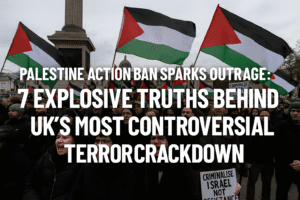Palestine Action Ban Sparks Outrage: 7 Explosive Truths Behind UK’s Most Controversial Terror Crackdown
The UK government’s move to ban Palestine Action as a terrorist organisation marks a dramatic escalation in its response to the group’s disruptive protests. Triggered by activists vandalizing military planes at RAF Brize Norton, Home Secretary Yvette Cooper argues the group’s escalating pattern of costly criminal damage targeting defence firms crosses into terrorism under the law, threatening national security.
Palestine Action fiercely rejects the label, calling it “unhinged” and asserting their actions – involving members like teachers and nurses – expose UK complicity in Israel’s Gaza campaign, fundamentally differing from violent extremist groups. The ban sparks intense debate: critics like Humza Yousaf and Nadia Whittome warn it dangerously misuses terror laws to silence dissent and sets a chilling precedent for protest, while the government insists peaceful advocacy remains protected.
At its heart, this confrontation forces a difficult societal question: where should democracies draw the line between legitimate, albeit disruptive, protest against perceived injustice and actions deemed a genuine threat to security? Parliament’s upcoming vote will decide the group’s fate, but the underlying tension over protest rights and state power remains unresolved.

Palestine Action Ban Sparks Outrage: 7 Explosive Truths Behind UK’s Most Controversial Terror Crackdown
The UK government’s move to outlaw Palestine Action under anti-terror laws isn’t just a security decision – it’s a flashpoint revealing profound tensions over protest, security, and the limits of dissent in modern Britain. Here’s the human story beneath the headlines:
The Spark: A Disruptive Escalation The immediate trigger was audacious: activists breached security at RAF Brize Norton, spray-painting two military transport planes red. Home Secretary Yvette Cooper called it “disgraceful” and “epically stupid,” framing it as a direct attack on national security. For Palestine Action, it was a symbolic act against planes they claim transport weapons enabling Israel’s actions in Gaza. This incident crystallized years of escalating tactics targeting defence contractors like Elbit Systems and Thales.
The Government’s Case: Criminality Masquerading as Cause Cooper asserts Palestine Action crossed a critical line:
- “Severity & Frequency”: Citing a documented history since 2020, including a £1.1 million arson attack in Glasgow and repeated factory invasions causing millions in damage.
- “Terrorism Threshold”: Arguing their systematic, costly disruption of critical defence infrastructure meets the legal definition under the Terrorism Act 2000.
- National Security Imperative: Positioning UK defence capabilities as non-negotiable, requiring robust protection from sabotage.
Crucially, Cooper insists this targets only Palestine Action, not peaceful protest or advocacy for Palestinian rights. “Vitally important that those seeking to protest peacefully… can continue to do so,” she stated.
Palestine Action’s Defence: Dissent vs. Terrorism The group’s response is one of incredulity and defiance:
- “Unhinged” & “Preposterous”: They vehemently reject the terror label, asking how teachers, nurses, and students spraying paint equate to groups like ISIS or Boko Haram.
- Targeting Complicity: They frame actions as disrupting companies they believe profit from Israel’s military campaign, calling UK government complicity the “real crime.”
- Chilling Effect Fear: They see the ban as government intimidation, designed to silence criticism of Israel by equating direct action against arms manufacturers with terrorism. Legal challenges are promised.
The Wider Ripples: A Democracy’s Dilemma The ban proposal ignites fierce debate beyond the group itself:
- Protest Under Pressure: Critics like former Scottish First Minister Humza Yousaf call it a “shameful abuse” of terror laws. Labour MP Nadia Whittome warns of a “dangerous precedent” for future governments silencing critics. Is disruptive, property-damaging protest inherently terroristic, or a legitimate (if controversial) tactic?
- Security vs. Liberty: How far should the state go to protect military assets? Does the response (enhanced security, potential 14-year sentences) match the threat level posed by paint and break-ins, however symbolically potent?
- The Gaza Shadow: The charged context of the Israel-Gaza conflict is inescapable. Palestine Action explicitly links its actions to opposing “genocide.” Israel denies these allegations, but the conflict fuels the group’s rationale and the emotional intensity surrounding the ban.
- Defining Terrorism: The government’s application of terror legislation to a group primarily engaged in property damage against corporate and military targets (however severe) raises fundamental questions about the scope and purpose of these powerful laws.
The Human Cost Beyond the legalities lie real people:
- Activists: Facing potential lengthy prison sentences for actions they see as morally imperative resistance.
- Workers: At targeted sites, experiencing disruption and fear.
- Police: Tasked with managing increasingly tense protests like the Trafalgar Square gathering, resulting in 13 arrests.
- The Public: Witnessing a government taking unprecedented steps against a protest movement, forcing a societal reckoning on where lines are drawn.
What Comes Next? The draft order heads to Parliament next week. If passed, supporting Palestine Action becomes a crime. But the deeper questions won’t be legislated away:
- Can a democracy tolerate highly disruptive, property-damaging protest without labelling it terrorism?
- Does targeting the arms trade through direct action constitute a threat to national security warranting such severe measures?
- How does a nation navigate passionate dissent on an internationally divisive issue like Gaza while upholding security and the rule of law?
The ban on Palestine Action isn’t just about one group; it’s a litmus test for British democracy in a polarized world, forcing us to confront uncomfortable questions about dissent, security, and the price of principle. The debate ignited in Trafalgar Square and the halls of Parliament is only beginning.
You must be logged in to post a comment.